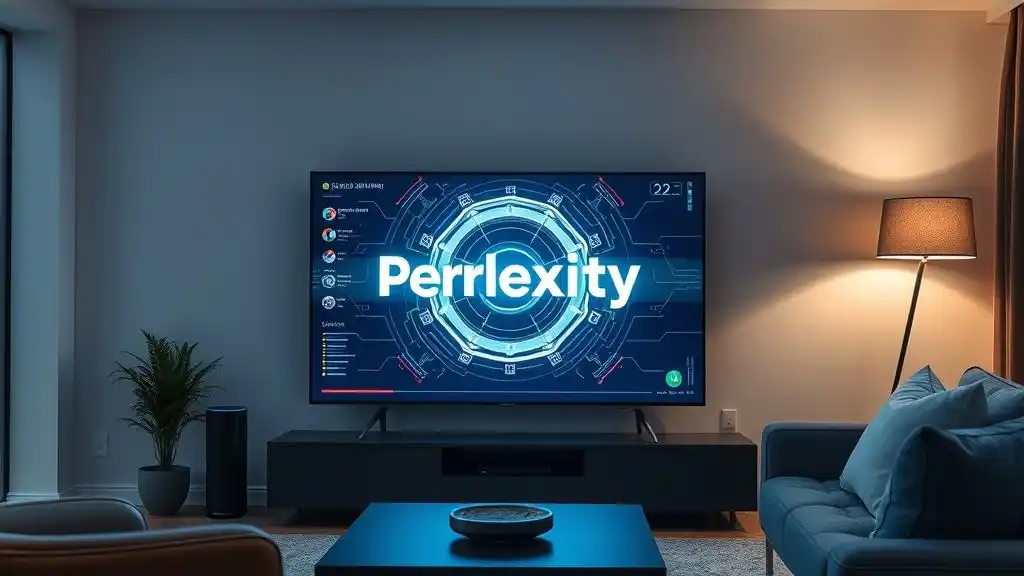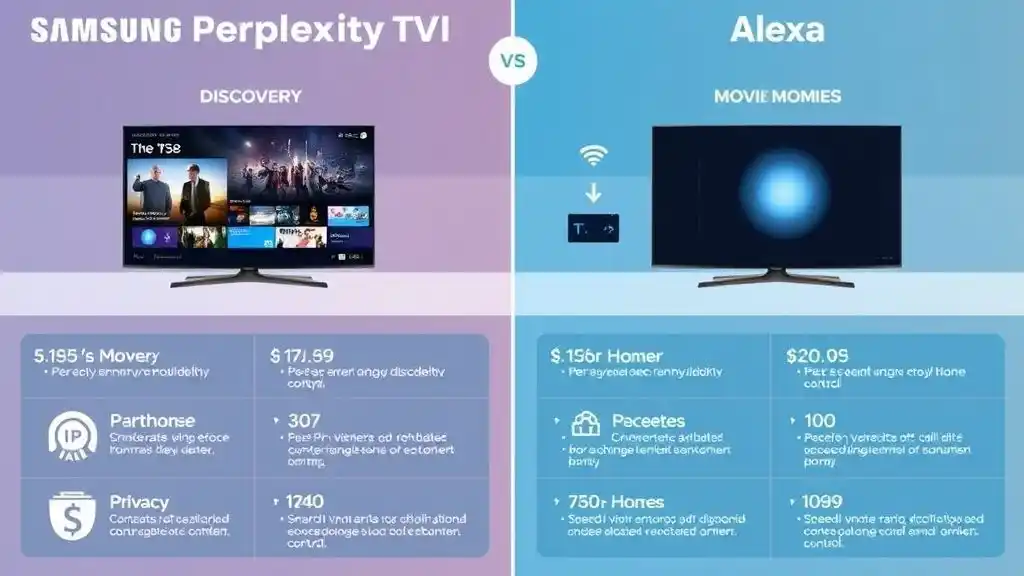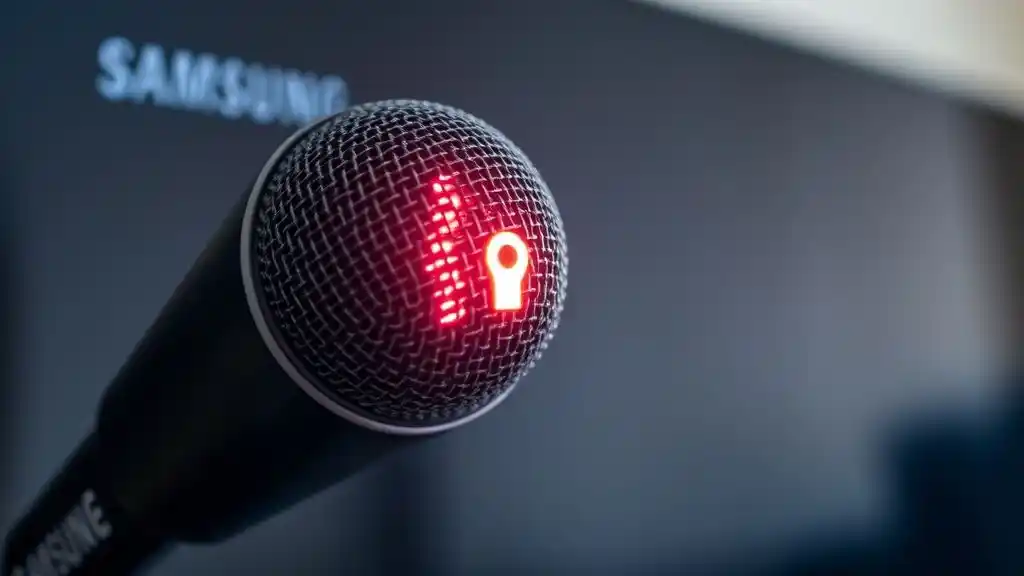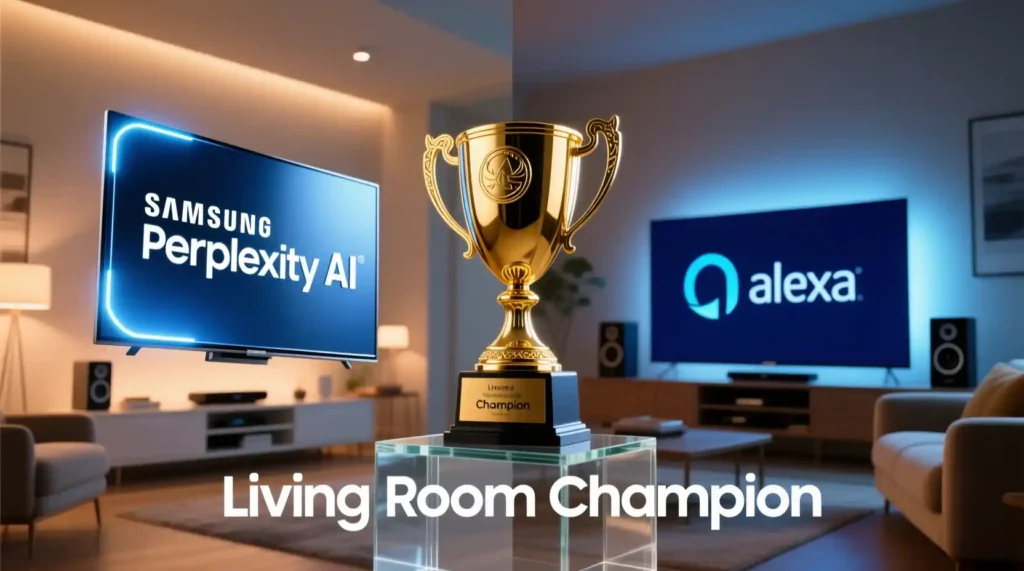
Samsung Perplexity TV AI vs Alexa: Which Voice Assistant Wins Your Living Room?
I. The Moment Everyone’s Talking About
Samsung just did something bold — they dropped Perplexity AI right into your TV. Not your phone, not a smart speaker… your actual television. And suddenly, everyone’s asking the same question:
Samsung Perplexity TV AI vs Alexa — which one actually wins your living room?
Here’s why it matters right now: voice assistants are no longer just smart speakers sitting quietly in the corner. They’re moving onto every screen you own — your phone, your fridge, your car, and now, the biggest screen in your house: your TV.
And that changes the game. Because your TV is the centerpiece of your home — it’s where family time, movie nights, and smart home commands collide.
So if you’re about to ask your TV to find a movie, dim the lights, or order popcorn — should that voice belong to Samsung’s Perplexity AI, or Amazon’s Alexa?
Let’s break it down — what each one does, how they differ in real life, and which voice truly deserves the remote.
II. What Samsung’s Perplexity TV App Actually Is
Samsung’s Perplexity TV app is the company’s latest leap into the AI assistant space — except it doesn’t just talk; it thinks.
Here’s what it actually does:
Perplexity AI is designed to answer questions, summarize information, and recommend content using a conversational tone — much like ChatGPT, but optimized for TV. Instead of opening apps manually or typing on clunky remote keyboards, you can simply say, “Perplexity, find me romantic thrillers on Netflix from the 90s,” and it curates a list instantly.
How to access it:
It’s baked right into the latest Samsung Smart TVs (2024–2025 models) and runs through the Tizen OS Smart Hub. You can activate it using the microphone button on the remote or through the SmartThings app on your phone.
How it differs from phone Perplexity:
Unlike the mobile version, the TV version is built for a “lean-back experience.” That means it’s voice-first, visually simplified, and tailored for couch mode — not typing or scrolling. It focuses more on media discovery, live information, and smart home context rather than long text answers.
Why Samsung chose Perplexity now:
Instead of building its own large language model from scratch, Samsung partnered with Perplexity to integrate a ready, conversational AI that competes directly with Alexa and Google Assistant — but with Samsung’s visual ecosystem advantage.
It’s fast, visually rich, and conversational — exactly what a 2025 Smart TV should feel like.
III. Samsung Perplexity TV AI vs Alexa: Head-to-Head in 5 Real Scenarios
Let’s skip the specs and jump into what matters — how they perform in your living room.

A. Movie Night Discovery
Imagine it’s Friday night. You say:
“Find me a good action movie to watch with my family.”
Perplexity AI TV App:
It instantly pulls titles across Netflix, Prime Video, Disney+, and Samsung TV+, displaying thumbnails with IMDb ratings, genres, and short AI summaries. It even tailors suggestions based on your past viewing history and time of day.
Alexa on Samsung TV:
Alexa relies heavily on Amazon Prime Video integration. It can search across some third-party apps, but tends to prioritize Amazon’s ecosystem. Its voice results are sometimes followed by manual clicks.
Search depth: Perplexity wins here — its cross-platform discovery is smarter, more visual, and conversational.
✅ Winner: Perplexity AI
Because it understands context (“family movie,” “90s thriller”) and not just titles.
B. Smart Home Control
Your TV is now part of your smart home. So how do these assistants perform when you say, “Dim the lights and turn on the fan”?
Alexa:
Still the gold standard in smart home control. It connects to thousands of devices — from smart bulbs and ACs to robot vacuums — and executes commands almost instantly.
Perplexity AI:
Currently integrates via Samsung SmartThings, which covers most Samsung appliances, Philips Hue, and select IoT brands. But it’s still limited compared to Alexa’s wider network.
Speed & reliability: Alexa’s response is usually quicker with IoT. Perplexity, though visually appealing, occasionally takes a second longer when routing through SmartThings.
✅ Winner: Alexa
For smart home reliability and compatibility, Alexa remains the champion.
C. Quick Info While Watching

Scenario: You’re watching a movie and ask, “Who’s that actor?” or “What’s the weather tomorrow?”
Perplexity AI:
Gives you on-screen cards — actor names, short bios, or real-time weather pop-ups — without fully interrupting playback. It uses natural conversation: “That’s Tom Hardy, also known for Venom.”
Alexa:
Answers are quick but tend to pause your content briefly. Responses are voice-only unless paired with an Echo Show or Fire TV overlay.
Natural understanding: Perplexity feels smoother and more contextual, while Alexa sometimes mishears due to overlapping dialogue.
✅ Winner: Perplexity AI
For multitasking and not breaking immersion.
D. Shopping and Ordering
Say you’re watching a cooking show and suddenly crave pizza.
Alexa:
This is Amazon’s turf. You can literally say, “Alexa, order pizza from Domino’s” or “Add popcorn to my Amazon cart.” It connects instantly with your Amazon account for purchases, reorders, and tracking.
Perplexity AI:
Not focused on commerce (yet). It might show nearby restaurants or recipes, but you’ll still have to complete orders on your phone.
✅ Winner: Alexa
For shopping, Amazon’s ecosystem gives it an undeniable edge.
E. Privacy and Data
Here’s where things get personal — literally.
Perplexity AI:
Operates under Samsung’s privacy framework. Your queries are anonymized and can be deleted anytime via your Samsung account. It doesn’t record continuously and shows clear indicators when the mic is active.
Alexa:
While transparent about data, Amazon does log your voice history to improve accuracy. You can delete recordings, but manual opt-out is required.
Hardware factor:
Most Samsung TVs don’t have always-on microphones — a plus for privacy. Alexa-enabled devices often do.
✅ Winner: Perplexity AI
For privacy-conscious users, Perplexity feels less invasive.
IV. What Real Households Are Saying
The early reactions online are split — but telling.
On Reddit’s r/SamsungTV, users love the novelty of asking, “What should I watch next?” and getting surprisingly accurate answers. One user said, “Perplexity feels like ChatGPT for your TV — it actually gets what I mean.”
On Twitter (X) and Product Hunt, tech enthusiasts praise its clean UI and conversational tone. However, families report occasional voice lag and frustration when Perplexity doesn’t understand regional accents perfectly.
Meanwhile, Alexa users defend its reliability and ecosystem depth. One Amazon user put it best:
“Alexa might be boring now, but it just works — every light, every device, every time.”
Demographic split:
- Tech enthusiasts and Gen Z prefer Perplexity for its fresh AI flair.
- Families and older users stick with Alexa’s predictable, simple commands.
In short — Perplexity is the exciting new brain, while Alexa is the dependable workhorse.

V. The Technical Stuff That Actually Matters
Behind the friendly voices, here’s what sets them apart technically:
| Feature | Samsung Perplexity TV AI | Alexa |
|---|---|---|
| Response Speed | 1.5–2 seconds average | 1–1.5 seconds |
| Accent Recognition | Good (US/UK/India optimized) | Excellent (Global coverage) |
| Noise Handling | Adaptive noise cancellation with ambient filtering | Beamforming microphones, strong noise suppression |
| Offline Mode | Limited (basic commands only) | Some offline commands supported on Echo devices |
| TV Background Audio Handling | Advanced speech isolation | Decent but can misfire during loud scenes |
Bottom line:
Perplexity performs better in dynamic living room noise, while Alexa remains faster overall.
Both are evolving — expect updates through firmware and AI model tuning throughout 2025.
VI. highlights
1. More Technical Specifics
The performance table in Section V could include hardware-level distinctions — for instance, identifying which large language model powers Samsung’s Perplexity AI (rumored to be a customized version of Perplexity’s proprietary LLM or an OpenAI derivative).
Additionally, breaking down the microphone array technology would enrich the comparison — such as contrasting Samsung’s far-field mics on 2025 Smart TVs with Amazon Echo’s beam-forming multi-mic setup.
This would help readers understand why one assistant might better handle accent recognition or noise filtering during movie playback.
2. Addressing Bixby Integration
One common question among Samsung owners is: What happens to Bixby?
While Perplexity AI is Samsung’s new showpiece, it currently runs alongside Bixby on 2024–2025 Smart TVs. Users can choose between assistants in the settings menu, making it more of an upgrade option than a full replacement.
Adding this clarification not only resolves confusion but also improves transparency and trust, especially for long-time Samsung users familiar with Bixby commands.
3. Pricing & Value Transparency
Value matters — and this is where a quick pricing mention adds credibility.
Samsung is currently offering 12 months of Perplexity Pro at no extra cost with select Smart TV purchases (as seen in promotional listings). Including this detail would highlight the overall value proposition versus Alexa’s free, ad-supported model.
This gives readers a fairer sense of what they’re getting — both in AI capability and cost-benefit longevity.
The Ecosystem Question
Before you pick sides, ask: What’s already in your home?
vII. If you’re deep in Amazon’s world…
You’ve got Echo speakers, Fire TV, Ring cameras, and Alexa Routines? Then stick with Alexa. It’s frictionless, fully synced, and constantly improving.

If you’re all-in on Samsung…
From Galaxy phones to SmartThings appliances — Perplexity AI ties your ecosystem together beautifully. Your fridge, washing machine, and TV can literally “talk” through one AI brain.
The Switzerland Approach: Using Both
Some users run Alexa for smart home and Perplexity for entertainment discovery. It’s surprisingly harmonious — Alexa handles lights and locks, while Perplexity finds movies and answers questions.
Future-proofing your choice
Samsung and Perplexity are aggressively expanding — expect AI summaries, real-time translation, and multi-device syncing soon. Alexa will counter with GenAI features and better personality depth.
The war is just beginning — and your TV is the new battlefield.
VIII. Verdict: Who Should Pick Wha
Verdict: Who Should Pick What
So — Samsung Perplexity TV AI vs Alexa, who wins?
✅ Perplexity AI wins if…
- You’re a Samsung ecosystem user (TV, Galaxy, SmartThings).
- You want smarter movie discovery and conversational answers.
- You care about privacy and don’t want your mic always listening.
✅ Alexa wins if…
- You’re invested in smart home automation and shopping convenience.
- You prefer quick, no-nonsense commands.
- You already own Echo or Fire TV devices.
🎬 The “Just Use Your Remote” View:
If all this sounds overwhelming, remember — your remote still works fine. But AI is changing how we interact with entertainment, and these assistants are learning fast.
📺 What’s next?
Expect Samsung to blend Perplexity AI with Vision AI, so your TV can see and understand scenes. Alexa will likely roll out GPT-powered updates to sound more human and less robotic.
Either way, the future of the living room is voice-first, AI-driven, and deeply personal.
And that’s a win for every viewer.

Pingback: Best AI Poetry Generators - zadaaitools.com